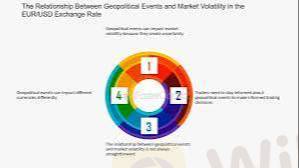
2025-02-15 18:19
IndustryGeopolitical Events and Forex Market Volatility
#firstdealofthenewyearastylz
Geopolitical events significantly impact forex market volatility because they influence investor sentiment, risk appetite, and economic stability. Here’s how different geopolitical factors affect currency movements:
1. War and Conflict
Wars or military tensions (e.g., Russia-Ukraine war) create risk aversion, leading investors to safe-haven currencies like the USD, CHF, and JPY.
Currencies of countries involved in conflicts tend to depreciate due to economic instability and capital flight.
2. Political Instability & Elections
Elections bring uncertainty, causing fluctuations in local currencies.
A government favoring expansionary policies can weaken a currency, while one promoting austerity and fiscal discipline can strengthen it.
Example: The UK’s Brexit vote caused the GBP to plunge due to uncertainty over economic prospects.
3. Trade Wars & Sanctions
Sanctions can collapse local currencies (e.g., Russian ruble in response to Western sanctions).
4. Central Bank Actions & Currency Wars
Geopolitical pressure on central banks can force changes in interest rate policies, impacting forex.
Countries may deliberately devalue their currencies to make exports more competitive.
5. Commodity Price Shocks & Resource Conflicts
Currencies of commodity-exporting nations (e.g., CAD, AUD, RUB) react strongly to oil, gold, and agricultural price movements.
Political instability in major oil-producing regions (e.g., the Middle East) often drives oil prices up, strengthening oil-backed currencies.
6. Diplomatic Relations & Economic Alliances
Strong diplomatic ties can boost investor confidence and currency stability.
Breakdowns in alliances or geopolitical realignments (e.g., countries exiting trade agreements) can weaken affected currencies.
Key Takeaway
Forex traders closely monitor geopolitical events, adjusting positions based on risk sentiment. During uncertainty, safe-haven demand rises, while politically unstable nations see capital outflows and currency depreciation.
Would you like insights on a specific geopolitical event’s forex impact?
Like 0

Samcooker
Brokers
Hot content
Industry
Event-A comment a day,Keep rewards worthy up to$27
Industry
Nigeria Event Giveaway-Win₦5000 Mobilephone Credit
Industry
Nigeria Event Giveaway-Win ₦2500 MobilePhoneCredit
Industry
South Africa Event-Come&Win 240ZAR Phone Credit
Industry
Nigeria Event-Discuss Forex&Win2500NGN PhoneCredit
Industry
[Nigeria Event]Discuss&win 2500 Naira Phone Credit
Forum category

Platform

Exhibition

Agent

Recruitment

EA

Industry

Market

Index
Geopolitical Events and Forex Market Volatility
 Hong Kong | 2025-02-15 18:19
Hong Kong | 2025-02-15 18:19#firstdealofthenewyearastylz
Geopolitical events significantly impact forex market volatility because they influence investor sentiment, risk appetite, and economic stability. Here’s how different geopolitical factors affect currency movements:
1. War and Conflict
Wars or military tensions (e.g., Russia-Ukraine war) create risk aversion, leading investors to safe-haven currencies like the USD, CHF, and JPY.
Currencies of countries involved in conflicts tend to depreciate due to economic instability and capital flight.
2. Political Instability & Elections
Elections bring uncertainty, causing fluctuations in local currencies.
A government favoring expansionary policies can weaken a currency, while one promoting austerity and fiscal discipline can strengthen it.
Example: The UK’s Brexit vote caused the GBP to plunge due to uncertainty over economic prospects.
3. Trade Wars & Sanctions
Sanctions can collapse local currencies (e.g., Russian ruble in response to Western sanctions).
4. Central Bank Actions & Currency Wars
Geopolitical pressure on central banks can force changes in interest rate policies, impacting forex.
Countries may deliberately devalue their currencies to make exports more competitive.
5. Commodity Price Shocks & Resource Conflicts
Currencies of commodity-exporting nations (e.g., CAD, AUD, RUB) react strongly to oil, gold, and agricultural price movements.
Political instability in major oil-producing regions (e.g., the Middle East) often drives oil prices up, strengthening oil-backed currencies.
6. Diplomatic Relations & Economic Alliances
Strong diplomatic ties can boost investor confidence and currency stability.
Breakdowns in alliances or geopolitical realignments (e.g., countries exiting trade agreements) can weaken affected currencies.
Key Takeaway
Forex traders closely monitor geopolitical events, adjusting positions based on risk sentiment. During uncertainty, safe-haven demand rises, while politically unstable nations see capital outflows and currency depreciation.
Would you like insights on a specific geopolitical event’s forex impact?
Like 0
I want to comment, too
Submit
0Comments

There is no comment yet. Make the first one.

Submit
There is no comment yet. Make the first one.